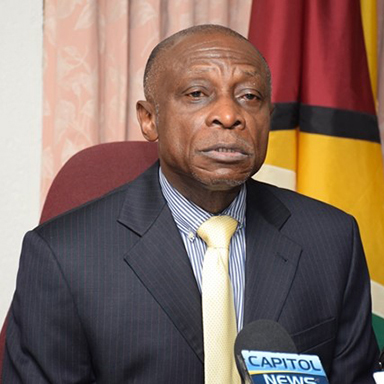One week after announcing that it has the jurisdiction to determine the validity of the 1899 Arbitral Award on the frontier between Guyana and Venezuela, the International Court of Justice (ICJ) has set January 15, 2021 as the date for the Case Management Conference.
In a letter to the editor, published in the December 25th edition of Stabroek News, Guyana’s Agent to the Court, Carl Greenidge, revealed that on the January date the ICJ will decide on the time to be allocated for the different elements of the hearing, including the presentation by the two sides and responses then deliberation by the judges. He stressed that none of these elements could take a year each and if Venezuela continues to abstain from participation, at least two elements will be suppressed and, consequently, this second leg of the ICJ exercise should take no more than two to three and a half years.
Since this case has already been before the Court for two and a half years, its conclusion should fall right around the five year average for the 20 or so ICJ cases on territorial disputes since 2000.
In his letter, Greenidge also sought to clarify the various roles of local and international advocates in the matter before the Court.
He stressed that as Agent, he is responsible for overseeing the preparations, finalizing strategy, liaising with the Government to ensure that it is informed of the needs for successful prosecution of the process and ensuring that the Advisory Committee established in 2016 is familiar with Government policy.
Sir Shridath Ramphal, one of two Co-Agents, is responsible for coordinating the inputs of the legal counsel and advocates.
Greenidge reminded that in addition to being internationally renowned as a negotiator, Ramphal brings unique first-hand experience of the specific technicalities, policies and events surrounding negotiation of the Geneva Agreement and the deliberations of the related Mixed Commission, which are central to the Court case.
The liaison with the team of international lawyers has been Ambassador Elisabeth Harper while the team itself includes two firms, which successfully fought the UNCLOS Arbitration case with Suriname on Guyana’s behalf. An overseas based Guyanese attorney has been added to the line up for this new case.
Other members are advocates who have participated in many of the ICJ’s landmark cases relating to boundary disputes in particular.
The other Co-Agent is former Foreign Affairs Ministry Director General Ambassador Audrey Waddell, who has been coordinating the domestic team which includes Ambassador Cedric Joseph a professional historian and author of seminal publications on the Controversy as well as other relevant Ambassadors such as former national and regional negotiators, including Dr Barton Scotland, Professor Duke Pollard and Ambassador Rudy Collins.
Attorney Ralph Ramkarran has been drawn from the private sector, inter alia, while Minister of Governance and Parliamentary Affairs Gail Teixeira represents the People’s Progressive Party/Civic. Greenidge reminded that Ramkarran and Scotland were at different times facilitators of the Good Offices Process, which preceded the enhanced Mediation phase.
According to Greenidge, the effort to definitively resolve the controversy was set in train in 2015 at the meeting between Presidents David Granger and Nicholas Maduro with Secretary General (SG) Ban Ki-Moon. The SG first called for a last effort at ‘dialogue’ between the two states and following preliminary exchanges the Guyana and Venezuela governments agreed, with different degrees of enthusiasm, to the SG’s concrete proposal, termed ‘enhanced mediation’ under the aegis of the SG’s Personal Representative, Ambassador Dag Nylander.
In 2016, Guyana’s Executive decided to field a team to pursue that initiative and Guyana established a multi-disciplinary, multi-sector, multi-national team, called the Advisory Committee (AC), to undertake the necessary preparation and representation.
“Only Guyana’s ‘successful’ navigation of the hazards posed by this process over the two subsequent years ensured that the matter would reach the Court. That was, in other words, the single most important step in the entire process to date,” the former Foreign Minister declared. He explained that most of the work within the AC was carried out by a team of Diplomats from the Ministry of Foreign Affairs (MoFA), inclusive of experienced former negotiators supported by some six largely young MoFA lawyers, a Maritime Consultant as well as Professor Philippe Sands and Professor Payam Akhavan from the International team of Lawyers.
In 2018, the 2015/6 Advisory Committee (AC), in order to deal with the June 30 Hearing of the ICJ, was reinforced with the full team of international lawyers, including, French jurist Alain Pellet and a Judge Ad Hoc, Hilary Charlesworth, to take into account the peculiarities, including, language and cultural make-up of the Court. “The lawyers are part of our national team and the lodging of the memorial and discussions of the case with the Registrar involved both lawyers and other representatives and were led by Guyana’s Agent to the ICJ,” he concluded.
On December 18, the Court concluded that not only could it determine the validity of the 1899 Arbitral Award on the frontier between Guyana and Venezuela but that it could address the related question of the definitive settlement of the land boundary controversy between the two territories.
The decision, which was delivered by the President of the ICJ, Judge Abdulqawi Ahmed Yusuf, is based on the text, the object and purpose of the February 17th 1966 Geneva Agreement, which aimed to address the controversy over the award, as well as the circumstances surrounding the agreement’s conclusion.
Specifically, the Court, by a majority of 12 votes to four, found that “by conferring on the Secretary-General [via the Geneva Agreement] the authority to choose the appropriate means of settlement of their controversy, including the possibility of recourse to judicial settlement by the International Court of Justice, Guyana and Venezuela consented to its jurisdiction.”

